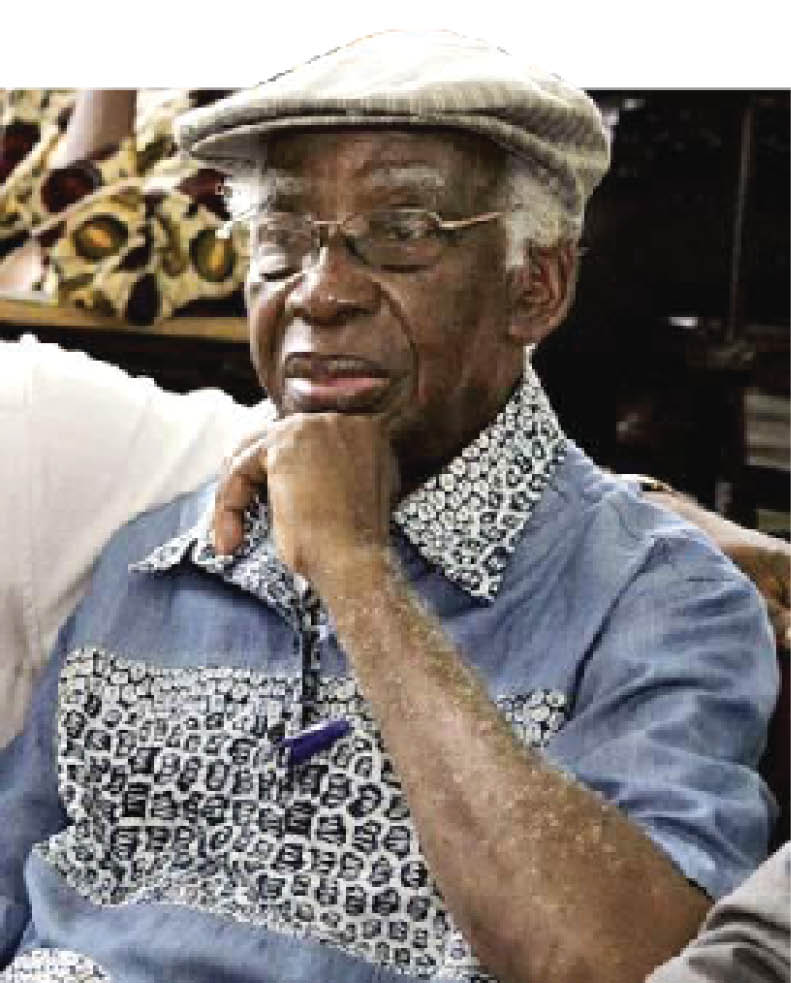The passing of Pa Gabriel Okara on the night of 24 March,2019 at a ripe old age of 98 may not be termed as shocking as it is something many of us in the writing community and his family may have been expecting due to his age but at the same time, it left us all with a feeling of deep loss. His death is the curtain call for the end of an era of African men and women of letters who were pioneers and who had adorned the African literary landscape with their totemic pieces in all genres of literature.
Okara was a famous poet with iconic and totemic poems such as ‘The Call of the River Nun’, ‘Piano and Drums’, ‘The Mystic Drum’, ‘You Laughed, Laughed and Laughed’, ‘The Invocation’ and many more that are well known and much anthologized. He was one of Africa’s pioneer poets and also one of Africa’s and Nigeria’s greatest poets. Most of us who studied literature in secondary school at a point in Nigeria when the subject was compulsory at a certain level of education before students branched out to specialize in arts and science were weaned with his poetry. We could not forget his ‘Piano and Drums’ and other totemic poems after being introduced to it in the classroom. Those of us who later went on to write poetry in life will always remember the dilemma expressed in ‘Piano and Drums’ and the imagistic call of nature in ‘The Call of the River Nun.’
Pa Okara’s poems about the Niger Delta ecosystem spoke of the time before the despoliation of the environment by oil exploration and his art was a forerunner to the justifiably angry tone of the later poets who came out of the Niger Delta of Nigeria. He contributed graciously to the development of environmentally sensitive poetry in Nigerian literature. The environment either inspires poetry or becomes the ubiquitous subject of poetry. Our local lore, songs, folktales and proverbs heavily derive their metaphors and rhythms from the environment. Poets from the forested, hilly, Sahelian, Savannah or aquatic regions find appropriate tropes in their environment to weave into their poetry. Gabriel Okara’s considerable literary oeuvres foreground the fact of a man and his art in tune with his environment. The serene world of his early poetry has given way to the poisoned atmosphere of the poetry of Tanure Ojiade, Nnimmo Bassey, Ogaga Ifowodo, Ebi Yeibo, G’ Ebinyo Ogbowei, Obari Gomba, Eriata Oribhabor and many more who can be called the literary children and grand-children of Gabriel Okara. He lived such a long life that he had to contend in many of his later poems such as in his 2004 collection, ‘The Dreamer’, ‘His Vision’, the realities of his dysfunctional nation and the despoliation of the Niger Delta environment that no longer evokes or inspires any poet to benign poetry.
Gabriel Okara was also well known for his experimental novel ‘The Voice’ which is a study in the indigenization of a foreign language or the transposition of a local speech act into a foreign tongue. Bernth Lindfors as quoted on the blurb of the book, which was first published in 1964, said “as interesting as the story itself is the language in which it is told. Okara appears to have made an attempt to render into English the expressive idiom of his own native Ijaw….” The novel since its publication has been a confounding piece of art in the medium employed, intriguing as Amos Tutuola’s ‘The Palmwine Drinkard’ and the later experiment of a fellow Niger Deltan, Ken Saro Wiwa, writing in what he termed “rotten English” in Sozaboy. Alas, members of the Association of Nigerian Authors (ANA) in Bayelsa State were planning to celebrate 55 years of the publication of that iconic novel ‘The Voice’ when Pa Gabriel Okara decided to heed the call of the River Nun.
Gabriel Okara was one old writer who related without prejudice with young writers. He was very encouraging to young writers without being judgmental like most of our older writers are. He was extremely patient with the foibles of young writers and you see him relating with them like a grand avuncular uncle. I met Gabriel Okara a couple of times at literary events and I admired his energy and sharp verbal reflexes in spite of his age. He attended almost every literary event he was invited to whether big or small, seeing none as too small for his big image and arriving there in good time. To me that was the mark of a great writer that was ready to assist others to be great like him. We will miss his quiet mien and grand old air about him of an unobtrusive pioneer African poet. He was dedicated to his art even in old age and showed that creativity could be a life-long enterprise. Nigerian writers and ANA will miss him but he had lived his time so well that the death of a person like him is a milestone and rather than mourn we should celebrate his eventful life of prodigious contributions to humanity through literature and public service.
Abdullahi is the president of the Association of Nigerian Authors (ANA).

 Join Daily Trust WhatsApp Community For Quick Access To News and Happenings Around You.
Join Daily Trust WhatsApp Community For Quick Access To News and Happenings Around You.


